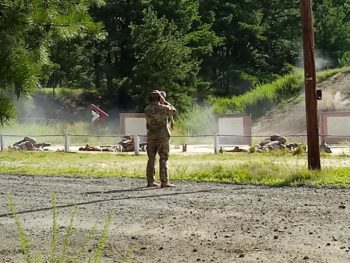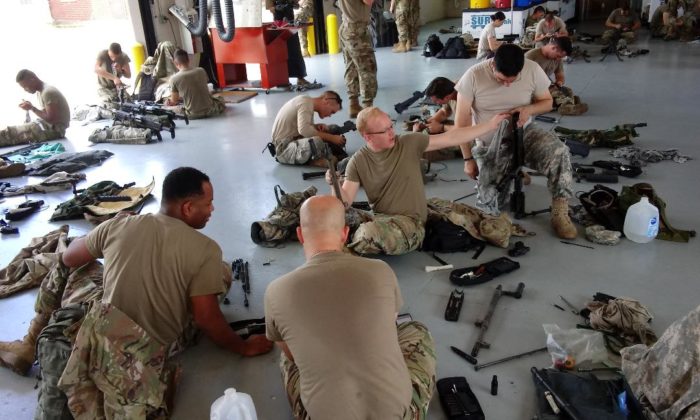Who Does Maintenance on Your Story’s Weapons? (And Other Stuff)
Authors, in your story worlds of fantasy and science fiction, do you think much about who has to do maintenance work on your weapons? Who cleans them and keeps them working, who does the behind-the-scenes stuff?

Putting holes in paper targets…into shapes equal to the size of a person at 500 meters (we also shot pop-ups up to 800 meters away).
My thoughts run this way at the moment because my Army Reserve unit sent me to a short course on shooting machine guns last week. I spent 4 training days with a weapon called the M240B–a piece of technology that if we could travel back in a time machine and hand it over to the brightest and best in WWI, say in Germany or the UK, the war would have turned out far differently than it actually did.
I considered posting on machine guns themselves, though I decided that’s too specialized a topic for Speculative Faith. But I think most people don’t really understand the difference between an assault rifle and a machine gun–for example, do you know a M240B can accurately hit targets around one kilometer away if on a tripod? And assault rifles are not designed to go tripods? That machine guns are fired in crews of at least two people? And that an M2 machine gun, which uses 50 caliber (12.7 mm) bullets, which was also used at our course (though not by me), can reliably hit targets around one MILE away?
I just don’t see that portrayed very much in fiction outside of military fiction…(for example, does anyone in The Walking Dead ever shoot anything from more than around 100 meters away?)

Cleaning M240B’s
But I’m getting away from my purpose here. Because my fourth day of training was in fact all about weapons maintenance. This is ordinary stuff for soldiers–I don’t mean to bore those of you who already know this–please keep reading because I’m going to apply this in just a bit. But our long day of range time translated into a next day of hours of scraping and daubing with cleansers the machined metal parts inside our weapons to remove the carbon accumulated from exploding gunpowder.
I think stories are generally aware of the issues of cleaning and maintaining weapons and other devices, though rather vaguely. We know Medieval times had blacksmiths and sometimes fantasy stories that include weapons talk about those who make weapons. But do we generally think of the fact that ordinary warriors had to keep weapons oiled to keep from rusting, had to know how to effectively sharpen them–and had specialists they turned to when something went seriously wrong with the weapons? Craftsmen (and women) who didn’t just hammer out steel, but who specialized in precious metal work, or jewels, or bone carving, or the leather of scabbards and holders?
Do you think much about the fact that bows were left unstrung in times of peace, because both the wood of the bow and the bowstring suffered damage from being under tension for too long? Or that any suit of armor required an entire team of people not only to build it, but to keep it in working order? (Etc.)
Lots of stories with magic in them mention those who create magic items–but it’s much rarer to talk about how magic items are maintained. If magic wands exist in a story, then it stands to reason from real world weapons that someone not only makes the wands but someone would specialize in repairing damaged wands. And users would probably have certain spells they use to maintain their wands in top working order on a routine basis. And not just wands, any magical device would require maintenance. And it might actually take an entire team of people to maintain or repair a single complex magical item.
Just like carbon accumulates on any weapon that uses gunpowder, why wouldn’t magic use leave some kind of residue that would have to be cleaned? Power, after all, is never really free–it always comes from somewhere and always has consequences, from large things to small.
I can understand, of course, if you don’t want to spend much time talking about magical residue. There are more important aspects of storytelling to be sure. But I recommend you keep these details in the back of your mind. Even brief references, here and there, to magical repair and maintenance could add a great deal of depth to a fantasy story.
And for my science fiction-writing friends, yes, it’s true that sci fi has given a fair amount of attention to maintenance. Star Trek alone has provided us Scotty, Geordi LaForge, Miles O’Brien and more major characters whose primary job was to keep the tech running. However, you don’t see much in the way of user-level maintenance and I’m pretty sure there would be some.
The reason to mention this aspect of speculative fiction stories is not to be picky or to zing stories for their shortcomings but because working on equipment, keeping it running, checking it before use, is such a big part of the life of a soldier in modern times. And it was also important to warriors in the past and no doubt will be important to the high-tech fighters of the future.
So don’t forget about it, writers. Every time any piece of equipment is used, especially weapons but everything else, too, it has to be maintained in one way or another. You may not want to focus on that–but it’s a major part of your characters’ lives, so you might want to mention it from time to time.
So having made that point, who are some of your favorite characters who had the job of keeping stuff running? I named three of my own favorites from Star Trek, but many, many more could be mentioned. I’d be especially interested in any fantasy characters who have maintained equipment. 🙂












































This is a good idea if you need to add realism to your story. Most authors, even fantasy, need to ground their world’s mechanics to ours in some way.
My latest book isn’t fantasy but I made a point to emphasize a trip to the bathroom in one scene. Not out of nowhere; there was good reason for it, and people do it on the reg. Why aren’t there more depictions of it?
Right. We don’t want to concentrate on background stuff because by definition it’s not our main focus, but mentioning such details as maintenance–or using the bathroom–when it’s called for makes sense to me. If characters are to be real to the reader, then they do real things, not all of which are glamorous.
Feels obligatory: Nerrrrrrrrrrrrrrrrrrrrrrrrd
Lol.
I gotta give a shout out to Kaylee from Firefly, who not only kept things running but also made them beautiful.
From a story standpoint, I can see most of us leave out maintenance because it doesn’t usually move the plot forward. But I can see where including it would add storyworld detail and character building.
Having a character _neglect_ the maintenance of their weapons could also make for some interesting disasters.
One time I saw an animation on youtube that was basically an old legend about a warrior that put his sword back in its sheath without cleaning the blood off first. Basically, he was in a wintery area, so the blood froze the blade to the sheath, leaving him unable to draw his sword to protect himself from a wolf attack, that that’s a good example of weapon neglect helping a story plot.
Sherwood Smith has Vidanric, the main character in her Stranger to Command novel clean his 4 throwing knives & sword after a battle with assassins on the road. He plunges them repeatedly in the earth as a (temporary) cleansing to get the blood off.
AND since her world includes some magic, the people as children learn a “waste spell” they recite as needed that takes care of the need for bathroom breaks. Doesn’t *that* sound useful? ?
A “waste spell”–that’s brilliant!
Kristen, one of the fantasy authors who mentions weapons maintenance is C. S. Lewis, on several different occasions. Best example–do you recall the scene in Voyage of the Dawn Treader where Prince Caspian checked in on Governor Grumpas, the governor of the Lone Islands? One of the things Caspian does is chew out the governor’s guards for failing to maintain their weapons–and specifically states what it was they were not doing. (Though Lewis had been a soldier in WWI and understood that part of a soldier’s life quite well.)
Though we should give you a shout out here, Kristen. Your novella anthology, Tales of the Phoenix (disclaimer: I publish this book), says quite a lot about how the airship The Phoenix is kept aloft and taken care of in the atmosphere of future Mars. As in your other books, you actually do a great job covering the details of ordinary life in a way that does not get boring. (Check it out everybody on Amazon: https://www.amazon.com/Tales-Phoenix-Medieval-Terraformed-Interplanetary-ebook/dp/B07FLQM75R/)
I really enjoyed this post, Travis.
I know Paksenarrion in The Deed of Paksenarrion by Elizabeth Moon had probably 5 or more mentions of weapons and taking care of them, as well as warriors. This trilogy (Sheepfarmer’s Daughter, Divided Allegiance, and Oath of Gold) are especially believable in this and many other areas because Moon was actually in the armed forces. I hope you enjoy these books as much as I did. They are cleaner than most fantasy, and a great read.
I unfortunately can’t recommend her other books as very clean, and her latest ones in the realm of Tsaia have gotten into witchcraft type stuff, but this trilogy has a solid lot to recommend it.
Thanks again, and have a great evening.
Azalea Dabill
Azalea, I haven’t read the Deed of Paksenarrion triology. Thanks for the recommendation.
Sorry to hear Moon progressively got more into questionable things as time went on. That’s something I’ve observed in more than just a few authors, sadly.
God bless you.